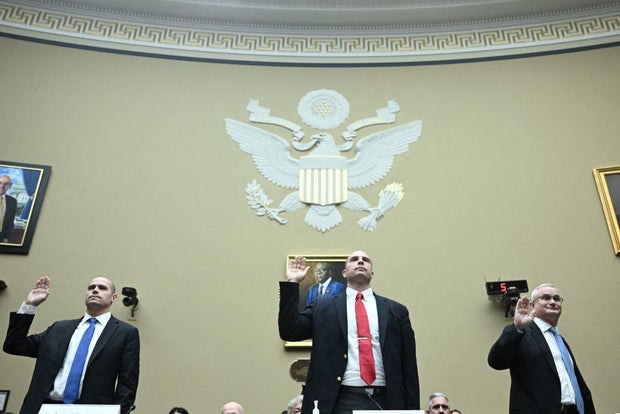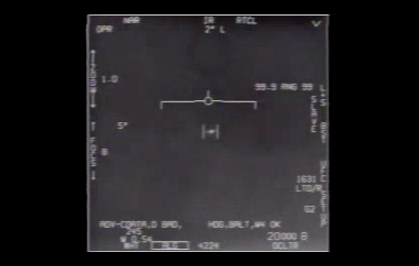Washington — A former military intelligence officer-turned-whistleblower told House lawmakers that Congress is being kept in the dark about unidentified anomalous phenomena, known as UAP or UFOs, alleging at a hearing that executive branch agencies have withheld information about the mysterious objects for years.
David Grusch, who served for 14 years as an intelligence officer in the Air Force and National Geospatial Intelligence Agency, appeared before the House Oversight Committee’s national security subcommittee alongside two former fighter pilots who had firsthand experience with UAP.
Grusch served as a representative on two Pentagon task forces investigating UAP until earlier this year. He told lawmakers that he was informed of “a multi-decade UAP crash retrieval and reverse-engineering program” during the course of his work examining classified programs. He said he was denied access to those programs when he requested it, and accused the military of misappropriating funds to shield these operations from congressional oversight. He later said he had interviewed officials who had direct knowledge of aircraft with “nonhuman” origins.
Members of both parties questioned how Congress should go about investigating the remarkable allegations, a reflection of the increasing willingness by lawmakers to demand the executive branch be more forthcoming about the phenomena.
“We’re going to uncover the cover-up, and I hope this is just the beginning of many more hearings and many more people coming forward about this,” said Rep. Tim Burchett, a Republican from Tennessee.
The Pentagon did not immediately respond to a request for comment about Grusch’s claims, but the department has denied his assertions in the past.
The UAP issue has gained widespread attention from Congress and the public in recent years with the release of several video recordings of the encounters, which typically show seemingly nondescript objects moving through the air at very high speeds with no apparent method of propulsion.
The Pentagon’s All-Domain Anomaly Resolution Office, which Congress established last year to investigate the incidents, has investigated roughly 800 reports of UAP as of May. While military officials have said most cases have innocuous origins, many others remain unexplained. Lawmakers say the military knows more about the objects than it has disclosed to Congress.
What the witnesses said at the UAP/UFO hearing
BRENDAN SMIALOWSKI/AFP via Getty Images
In addition to Grusch, the panel heard testimony from Ryan Graves, a former Navy pilot who has spoken out about encountering UAP on training missions, and David Fravor, who shot the now-famous “Tic Tac” video of a large object during a flight off the coast of California in 2004.
All three witnesses said current reporting systems are inadequate to investigate UAP encounters, and said a stigma still exists for pilots and officials who press for more transparency about their experiences.
Graves was an F-18 pilot stationed in Virginia Beach in 2014 when his squadron first began detecting unknown objects. He described them as “dark grey or black cubes … inside of a clear sphere, where the apex or tips of the cubes were touching the inside of that sphere.”
He said a fellow pilot told him about one incident about 10 miles off the coast, in which an object between 5 and 15 feet in diameter flew between two F-18s and came within 50 feet of the aircraft. He said there was no acknowledgement of the incident or way to report the encounter at the time.
UAP encounters, he said, were “not rare or isolated.”
“If everyone could see the sensor and video data I witnessed, our national conversation would change,” Graves said. “I urge us to put aside stigma and address the security and safety issue this topic represents. If UAP are foreign drones, it is an urgent national security problem. If it is something else, it is an issue for science. In either case, unidentified objects are a concern for flight safety. The American people deserve to know what is happening in our skies. It is long overdue.”
Grusch served as the National Reconnaissance Office’s representative to the AARO and its predecessor task force. While he said he couldn’t answer many questions about what he knew about classified programs in Wednesday’s open hearing, he said he was “hopeful that my actions will ultimately lead to a positive outcome of increased transparency.”
Fravor recounted his 2004 encounter with an object off the California coast. He told the subcommittee that the smooth, seamless oval-shaped object was spotted hovering over the water before rapidly climbing about 12,000 feet in the air. It then accelerated and disappeared. It was detected roughly 60 miles away less than a minute later.
“I think what we experienced was, like I said, well beyond the material science and the capabilities that we had at the time, that we have currently or that we’re going to have in the next 10 to 20 years,” Fravor said.
Department of Defense
Congress pushes for UAP/UFO transparency
Wednesday’s hearing took place amid a growing willingness by lawmakers to demand the military and intelligence agencies release more about what they know regarding the mysterious incidents, with many members of Congress citing the potential national security threat posed by unknown objects in or near U.S. airspace.
A bipartisan group of senators led by Majority Leader Chuck Schumer introduced an amendment to the annual defense spending bill currently making its way through Congress. The measure, modeled off legislation aimed at revealing government records about the assassination of President John F. Kennedy, would require executive branch agencies to hand over UAP records to a review board with “the presumption of immediate disclosure.” Agencies would have to justify requests to keep records classified.
A different House panel heard testimony from Pentagon officials at the first open hearing about the issue in more than 50 years last summer.
At Wednesday’s hearing, lawmakers of both parties expressed anger about their inability to get information about UAP from the military and intelligence agencies, describing a system of overclassification that shields reports of incident from public view.
“We should have disclosure today. We should have disclosure tomorrow. The time has come,” said Democratic Rep. Jared Moskowitz of Florida.
“Several of us are going to look forward to getting some answers in a more confidential setting. I assume some legislation will come out of this,” said GOP Rep. Glenn Grothman, the subcommittee’s chairman.

